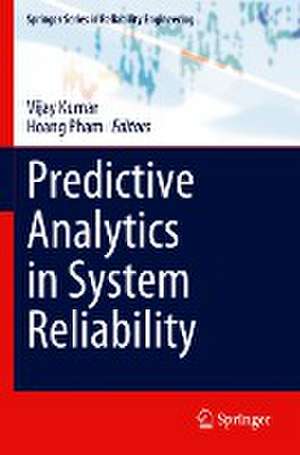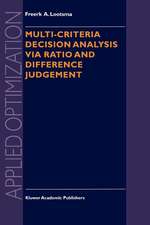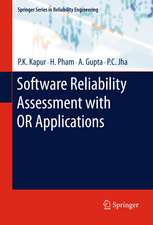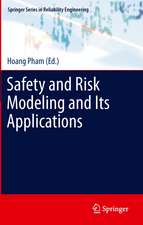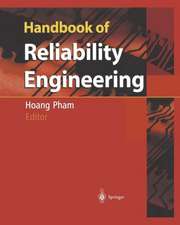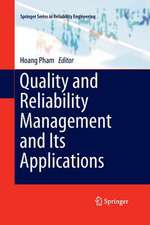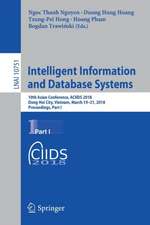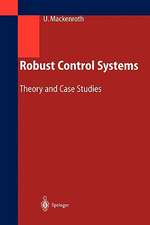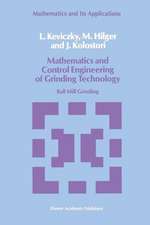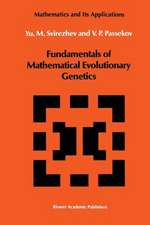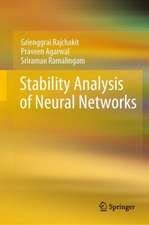Predictive Analytics in System Reliability: Springer Series in Reliability Engineering
Editat de Vijay Kumar, Hoang Phamen Limba Engleză Paperback – 10 sep 2023
This book provides engineers and researchers knowledge to help them in system reliability analysis using machine learning, artificial intelligence, big data, genetic algorithm, information theory, multi-criteria decision making, and other techniques. It will also be useful to students learning reliability engineering.
The book brings readers up to date with how system reliability relates to the latest techniques of AI, big data, genetic algorithm, information theory, and multi-criteria decision making and points toward future developments in the subject.
| Toate formatele și edițiile | Preț | Express |
|---|---|---|
| Paperback (1) | 641.78 lei 43-57 zile | |
| Springer International Publishing – 10 sep 2023 | 641.78 lei 43-57 zile | |
| Hardback (1) | 647.40 lei 43-57 zile | |
| Springer International Publishing – 9 sep 2022 | 647.40 lei 43-57 zile |
Din seria Springer Series in Reliability Engineering
- 18%
 Preț: 1406.66 lei
Preț: 1406.66 lei - 18%
 Preț: 1122.56 lei
Preț: 1122.56 lei - 20%
 Preț: 1277.89 lei
Preț: 1277.89 lei - 18%
 Preț: 952.09 lei
Preț: 952.09 lei - 24%
 Preț: 1048.70 lei
Preț: 1048.70 lei - 20%
 Preț: 940.34 lei
Preț: 940.34 lei - 20%
 Preț: 987.32 lei
Preț: 987.32 lei - 18%
 Preț: 951.29 lei
Preț: 951.29 lei - 18%
 Preț: 947.02 lei
Preț: 947.02 lei - 15%
 Preț: 651.51 lei
Preț: 651.51 lei - 15%
 Preț: 635.65 lei
Preț: 635.65 lei - 18%
 Preț: 1228.44 lei
Preț: 1228.44 lei - 18%
 Preț: 1227.67 lei
Preț: 1227.67 lei - 18%
 Preț: 952.89 lei
Preț: 952.89 lei - 18%
 Preț: 1234.94 lei
Preț: 1234.94 lei - 18%
 Preț: 952.09 lei
Preț: 952.09 lei - 18%
 Preț: 1236.19 lei
Preț: 1236.19 lei - 18%
 Preț: 1322.35 lei
Preț: 1322.35 lei - 20%
 Preț: 1274.57 lei
Preț: 1274.57 lei - 15%
 Preț: 643.34 lei
Preț: 643.34 lei - 18%
 Preț: 1109.16 lei
Preț: 1109.16 lei - 15%
 Preț: 635.65 lei
Preț: 635.65 lei - 15%
 Preț: 654.62 lei
Preț: 654.62 lei - 18%
 Preț: 944.99 lei
Preț: 944.99 lei - 18%
 Preț: 953.65 lei
Preț: 953.65 lei - 18%
 Preț: 1213.16 lei
Preț: 1213.16 lei - 18%
 Preț: 956.50 lei
Preț: 956.50 lei - 15%
 Preț: 644.95 lei
Preț: 644.95 lei - 18%
 Preț: 950.52 lei
Preț: 950.52 lei - 18%
 Preț: 1233.97 lei
Preț: 1233.97 lei - 15%
 Preț: 640.06 lei
Preț: 640.06 lei - 18%
 Preț: 956.69 lei
Preț: 956.69 lei - 18%
 Preț: 940.39 lei
Preț: 940.39 lei - 18%
 Preț: 948.92 lei
Preț: 948.92 lei -
 Preț: 389.70 lei
Preț: 389.70 lei - 18%
 Preț: 943.73 lei
Preț: 943.73 lei - 18%
 Preț: 940.57 lei
Preț: 940.57 lei - 20%
 Preț: 985.03 lei
Preț: 985.03 lei - 18%
 Preț: 943.43 lei
Preț: 943.43 lei - 18%
 Preț: 1218.21 lei
Preț: 1218.21 lei - 18%
 Preț: 948.16 lei
Preț: 948.16 lei - 18%
 Preț: 948.92 lei
Preț: 948.92 lei - 18%
 Preț: 1727.24 lei
Preț: 1727.24 lei - 15%
 Preț: 638.43 lei
Preț: 638.43 lei - 24%
 Preț: 802.76 lei
Preț: 802.76 lei
Preț: 641.78 lei
Preț vechi: 755.03 lei
-15% Nou
Puncte Express: 963
Preț estimativ în valută:
122.84€ • 133.48$ • 103.26£
122.84€ • 133.48$ • 103.26£
Carte tipărită la comandă
Livrare economică 21 aprilie-05 mai
Preluare comenzi: 021 569.72.76
Specificații
ISBN-13: 9783031053498
ISBN-10: 3031053494
Pagini: 282
Ilustrații: XI, 282 p. 94 illus., 56 illus. in color.
Dimensiuni: 155 x 235 mm
Greutate: 0.46 kg
Ediția:1st ed. 2023
Editura: Springer International Publishing
Colecția Springer
Seria Springer Series in Reliability Engineering
Locul publicării:Cham, Switzerland
ISBN-10: 3031053494
Pagini: 282
Ilustrații: XI, 282 p. 94 illus., 56 illus. in color.
Dimensiuni: 155 x 235 mm
Greutate: 0.46 kg
Ediția:1st ed. 2023
Editura: Springer International Publishing
Colecția Springer
Seria Springer Series in Reliability Engineering
Locul publicării:Cham, Switzerland
Cuprins
Chapter 1. Deep Learning Approach for the Reliability Assessment of Cloud and Edge Open Source Software (Hironobu SONE).- Chapter 2. Parameter Estimation of Software Reliability Growth Models using Mayfly Optimization (Ankur Choudhary).- Chapter 3. Study of Automation of Test Generation using Genetic Algorithm Approach (Sonali Vyas).- Chapter 4. Measuring and evaluating big data factors in an enterprise using fuzzy based MOORA and Best Worst Method (Abhishek Srivastava).- Chapter 5. Reliability assessment and profit analysis of automated teller machine system under copular repair policy (Ibrahim Yusuf).- Chapter 6. Entropy-Based Mathematical Modeling for Software Evolution (V.B.Singh).-Chapter 7. Development of Reliability Block Diagram (RBD) Model for Reliability Analysis of a Steam Boiler System (Suyog S. Patil).- Chapter 8. Prediction of software failure using fuzzy time series method (Mohamed Ashik. A).- Chapter 9. Big Data Quality Management System (Yury Klochkov).-Chapter 10. A Deep Analysis of Bad Smells using Machine Learning Classifiers (Aakanshi Gupta).- Chapter 11. Multi-Criterion Intuitionistic Fuzzy-TOPSIS Based Analysis for Software Quality Metric (Adarsh Anand).-Chapter 12. Reliability Allocation and Sensitivity Assessment of Solar Air Conditioner from Markov Process (Akshay Kumar).- Chapter 13. Design and Development of Question Answering System using Named Entity Recognition (NER) (Abhijit Kumar).- Chapter 14. Multi-attribute utility functions based strategic decision for software release time optimization (Vishal Pradhan).- Chapter 15. Empirical Evaluation of Code Bad Smells in Open-Source Software using Machine learning technique (Stuti Tandon).- Chapter 16. Reliability optimization of a system stand by system using PSO technique (Mangey Ram).- Chapter 17. Probabilistic model for the availability analysis of the milling section of rice mill plant (Ibrahim Yusuf).- Chapter 18. An Opportunistic Maintenance Model of Load Sharing Systems with PM and Minimal Repairs (Maryam Arabzadeh).
Notă biografică
Dr. Vijay Kumar received his M.Sc. in Applied Mathematics and M.Phil. in Mathematics from Indian Institute of Technology (IIT), Roorkee, India in 1998 and 2000, respectively. He has completed his PhD from the Department of Operational Research, University of Delhi. Currently, he is an Associate Professor in the Department of Mathematics, Amity Institute of Applied Sciences, Amity University Uttar Pradesh, Noida, India. He is the co-authored of one book and has published more than 55 research papers in the areas of software reliability, mathematical modeling and optimization in international journals and conferences of high repute. His current research interests include software reliability growth modelling, optimal control theory and marketing models in the context of innovation diffusion theory. He has reviewed many papers for Soft Computing(Springer), IJRQSE, IJQRM, IJSAEM and other reputed journals. He has edited special issues of IJAMS, CMES (Taylor & Francis), and RIO journal. He is an editorial board member of IJMEMS. He is a life member of Society for Reliability Engineering, Quality and Operations Management (SREQOM).
Dr. Hoang Pham is Distinguished Professor and Former Chairman (2007-2013) of the Department of Industrial and Systems Engineering at Rutgers University, New Jersey. Before joining Rutgers, he was Senior Engineering Specialist with the Boeing Company and the Idaho National Engineering Laboratory. He has been served as Editor-in-Chief, Editor, Associate Editor, Guest Editor, and Board Member of many journals. He is Author or Coauthor of 7 books and has published over 190 journal articles and edited 15 books including Springer Handbook in Engineering Statistics and Handbook in Reliability Engineering. He has delivered over 40 invited keynote and plenary speeches at many international conferences. His numerous awards include the 2009 IEEE Reliability Society Engineer of the Year Award. He is a Fellow of the Institute of Electrical and Electronics Engineers (IEEE) and the Institute of Industrial Engineers (IIE).
Dr. Hoang Pham is Distinguished Professor and Former Chairman (2007-2013) of the Department of Industrial and Systems Engineering at Rutgers University, New Jersey. Before joining Rutgers, he was Senior Engineering Specialist with the Boeing Company and the Idaho National Engineering Laboratory. He has been served as Editor-in-Chief, Editor, Associate Editor, Guest Editor, and Board Member of many journals. He is Author or Coauthor of 7 books and has published over 190 journal articles and edited 15 books including Springer Handbook in Engineering Statistics and Handbook in Reliability Engineering. He has delivered over 40 invited keynote and plenary speeches at many international conferences. His numerous awards include the 2009 IEEE Reliability Society Engineer of the Year Award. He is a Fellow of the Institute of Electrical and Electronics Engineers (IEEE) and the Institute of Industrial Engineers (IIE).
Textul de pe ultima copertă
This book provides engineers and researchers knowledge to help them in system reliability analysis using machine learning, artificial intelligence, big data, genetic algorithm, information theory, multi-criteria decision making, and other techniques. It will also be useful to students learning reliability engineering.
The book brings readers up to date with how system reliability relates to the latest techniques of AI, big data, genetic algorithm, information theory, and multi-criteria decision making and points toward future developments in the subject.
Caracteristici
Describes how system reliability is being influenced by AI, big data, genetic algorithms, information theory Brings readers up to date with the latest knowledge on system reliability It is a guide for graduate students, researchers, and professors in reliability
